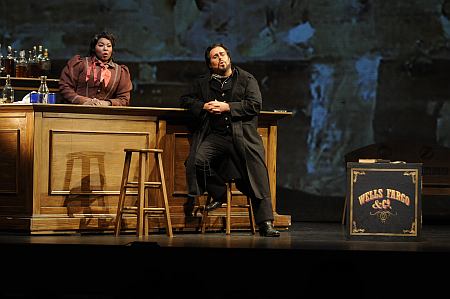The Girl of the Golden West is something of an oddball in opera. It's the work of the masterful composer Giacomo Puccini, but it is not performed anywhere near as often as the famous La Boheme and Madame Butterfly. It has a fun setup as a romantic Western, but it is not a comic opera. In fact, it is full of drama and beautiful arias, but shockingly no one dies in the end. Puccini obviously bought fully into the myth of the American West -- its romance, adventure, and boundless optimism untempered by any harsh reality.
This is the first time Kentucky Opera has ever produced The Girl of the Golden West, leading one to ask, why is such an obviously crowd-pleasing story so rarely performed? After all, if there was ever an opera for a Kentucky audience, this is it: whiskey (we'll just assume it's really bourbon), guns, and gambling all figure prominently in the staging. Well, one reason is that it features famously difficult lead roles, particularly for the soprano -- the pistol-packing, bible-quoting saloon keeper Minnie, who falls in love with an outlaw. If you don't have someone who can pull off Minnie, you might as well hang it up.
Kentucky Opera must have known they had their ace in the hole with Michelle Johnson, who more than pulls off the role. Johnson's physical presence projects warmth and grace, and her rich, lush voice exhibits both roundness and versatility. When Minnie sings about the love between her parents and her memories of home in the aria "Laggiù nel Soledad" she is lyrical and winning. There is one little phrase where she remembers how her mother nudged her father's foot under the card table, and you could tell that Johnson really gets the feeling behind the words. Small details, beautifully rendered.
Johnson's counterpart is tenor Jonathan Burton as the outlaw, Ramerrez, who has become something of a regular at Kentucky Opera, and that's a good thing. Burton has the vocal prowess required by Puccini, packing power and beauty into heart-meltingly romantic songs. It doesn't hurt, that physically, he reminds me of Pavarotti and has the same magnetic smile. The chemistry between the couple was sweet and believable. But the leads don't get all the spotlight moments. The large chorus of miners and barroom brawlers were particularly enjoyable (directed by chorus master Lisa Hasson). There's a lovely moment early in the show where the homesick miners listen to a minstrel sing "Che faranno i vecchi miei" and are moved to take up a collection to send one of their own back to his family. In a nicely staged bit of symmetry, the silhouette of the chorus singing farewell to him repeats at the very end when they send Minnie and Ramerrez off into the sunset.

Baritone Franco Pomponi as Sheriff Jack Rance is as sharp as his black suit and perfectly coiffed hair, capturing both his character's essential honesty and the barely-harnessed passion of his feelings for Minnie. He evoked spontaneous applause for his performance and added a memorable flair to the curtain call when he turned on his nemesis, Burton/Ramerrez and punched him, igniting a playful stage brawl as the curtain fell. I couldn't help but wonder, how many times does the baritone really want to go over and slug the tenor at the end? A dream, realized?
This was a very polished production, directed by John Hoomes and designed by Barry Steele with projected backdrops of mountains, falling snow, and riders on horseback. Conductor J. David Jackson directed the Louisville Orchestra in the pit, sounding as assured and seamless with the singers as usual. For the first time ever in a review, I have to give a nod to the supertitles written by Hoomes, which made me and a good part of the audience chuckle out loud a few times. "He wouldn't know justice if it bit him in the butt," is probably not exactly what the librettist wrote, but it does capture the sentiment pretty well!
If tickets are still available for tomorrow's matinee at the Brown Theatre, I would advise you to take in Michelle Johnson's wonderful performance. Yes, it's almost three hours, but you'll hardly notice the length, and it's three acts are punctuated by two intermissions.
Photo Credits: Patrick Pfister



